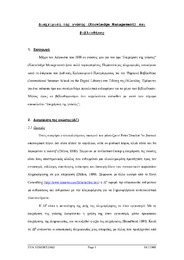| dc.contributor.author | Σεμερτζάκη, Εύα (Σεμερτζάκη-Κούτρα, Εύα) | el_GR |
| dc.contributor.author | Semertzaki, Eva (Semertzaki-Koutra, Eva) | en |
| dc.coverage.spatial | GR | en |
| dc.date.accessioned | 2013-06-12T11:47:08Z | |
| dc.date.available | 2010-07-26T12:00:00Z | el_GR |
| dc.date.available | 2013-06-12T11:47:08Z | |
| dc.date.issued | 2000 | el_GR |
| dc.identifier.uri | http://hdl.handle.net/10797/12595 | |
| dc.description | Περιέχει το πλήρες κείμενο | el_GR |
| dc.description.abstract | The paper defines the knowledge management (KM) as the understanding the information flow in organizations. The characteristics of KM are presented, too. Libraries are the institutions that traditionally manage knowledge and information through the classification process. The implications of KM in libraries include gathering queries and answers, links to documents related to queries, favorable sources in any format and any other source of information generated by the organization to create a pool of knowledge in favor of the organization. Libraries are pertinent places to organize, codify and make the information sources accessible. Libraries can be transformed to enterprises of creating knowledge. | en |
| dc.language.iso | gre | en |
| dc.source | Το άρθρο δημοσιεύθηκε στο Περιοδικό «Σύγχρονη Βιβλιοθήκη και Υπηρεσίες Πληροφόρησης», 2000, n. 4/5, pp. 3-12. | el_GR |
| dc.title | Διαχείριση της γνώσης (Knowledge Management) και βιβλιοθήκες | el_GR |
| dc.type | Article | en |
| dc.subject.uncontrolledterm | Knowledge management | en |
| dc.subject.uncontrolledterm | Libraries | en |
| dc.subject.JITA | Διαχείριση υπηρεσιών, λειτουργιών και τεχνικών πληροφόρησης | el_GR |
| dc.subject.JITA | Information treatment for information services, Information functions and techniques | en |
| dc.identifier.JITA | IZ | en |
